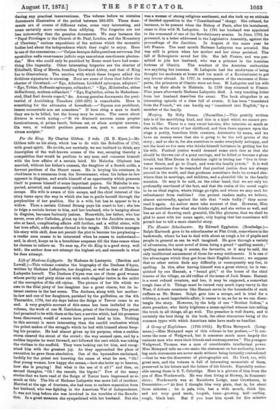CURRENT LITERATURE.
The Third Volume of Councils and Ecclesiastical Documents relating to Great Britain and Ireland (the Clarendon Press) appears, "edited, after Shelman and Wilkins," by Messrs. Haddan and Stubbs, the third' in this instance preceding the second volume, an arrangement neces- sitated by the illness of one of the editors of the latter, and not pro-
dacing any practical inconvenience. The volume before us contains documents illustrative of the period between 595-870. These doon- manta are of course of different value, some very interesting, and some certainly more carious than edifying. The forgeries are not less noteworthy than the genuine documents. We may instance the "Papal Privileges to the Church of St. Paul, London, and the Monastery of Chertaey," curious expositions of the notions which the monastic bodies had about the independence which they ought to enjoy. Here is one of the concession,:—" Culpas denique delinquentium servoram Del apostolicao aedis reservamus judicio erga canonicam sanctionem plecten- daa." Men who could only be punished by Rome must have had some- thing like impunity. Other interesting forgeries are the charter of Ethelbald, King of Marcia, founding Crowland Abbey, and that of King me to Glastonbury. The unction with which these forgers added the fictitious signatures is amusing. Here are some of those that follow the charter of Crowland :—" Ego, Aduninus, Lichfield episcopus, adoptavi."
4' Ego, Tobias, Roffensis episcopus, "Ego, 2Ethelredus, abbas deBardeney, multum collaudavi." "Ego,Ecgbaldus, abbas de Medesham- sted, illad fieri devote rogavi," &c. Among genuine documents the peni- tential of Archbishop Theodore (663-690) is remarkable. Here is something for the advocates of horseflesh :—" Equum non prohibent, tamen consuetude non eat comedere." If bees sting a man to death they are to be killed, but the honey may be eaten. The canon about divorce is worth noting :—" Si vir dimiserit uxorem suam propter fornicationem, si prima fuerit, licitum est, ut aliam accipiat uxorom ; illa yore, si volnerit ponitere peccata sna, post v. annos odium virum accipiat."



































 Previous page
Previous page